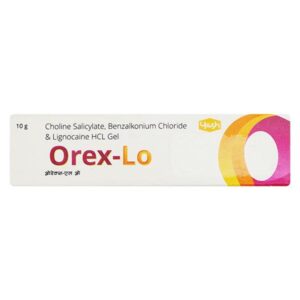BENZALKONIUM CHLORIDE + LIGNOCAINE + CHOLINE SALICYTATE
Benzalkonium Chloride: Benzalkonium Chloride is an antiseptic and disinfectant that is commonly used in pharmaceuticals and household products.
Use: Benzalkonium Chloride is primarily used for disinfecting and sanitizing purposes. It is found in various medical antiseptic products such as hand sanitizers, wound cleansers, and surface disinfectants. In household products, it can be found in disinfectant wipes, mouthwashes, and eye drops.
Mechanism of action: Benzalkonium Chloride works by disrupting the cell membranes of bacteria and other microorganisms. It inhibits their growth and kills them by interfering with their osmotic equilibrium, leading to cell lysis. As a disinfectant, it is effective against a wide range of bacteria, viruses, and fungi.
Dose: The concentration of Benzalkonium Chloride in products can vary. For hand sanitizers, the concentration usually ranges from 0.1% to 0.2%. In eye drops, it is typically found at a concentration of 0.01% to 0.02%. The exact dose and frequency of use depend on the specific product and the instructions provided.
Side effects: While generally considered safe when used as directed, Benzalkonium Chloride can cause some side effects. In individuals with sensitive skin or mucous membranes, it may cause irritation, redness, or allergic reactions. Prolonged or excessive use of products containing Benzalkonium Chloride can lead to dryness or cracking of the skin. In rare cases, it may cause toxicity if ingested or if it comes into contact with the eyes, resulting in eye irritation or damage.
It is important to read and follow the instructions on the product label and consult a healthcare professional if you have any concerns or experience any adverse reactions.
Lignocaine: Lignocaine, also known as Lidocaine, is a local anesthetic medication that is commonly used to numb an area of the body during medical or dental procedures. It works by blocking nerve signals in the body, thereby temporarily numbing the area and reducing pain.
Lignocaine is used in a variety of healthcare settings, including dental procedures, minor surgeries, skin procedures, and as a part of regional anesthesia. It can also be administered as a topical cream or gel for pain relief from conditions like sunburns, insect bites, or minor burns.
The dose of Lignocaine can vary depending on the purpose and route of administration. For local anesthesia, it is usually injected into the affected area. The dosage is determined based on factors like the patient’s age, weight, and the area being treated. It is important to follow the prescribed dose and the instructions provided by the healthcare professional.
Lignocaine can cause some side effects, which are generally rare and mild. Common side effects may include temporary numbness, tingling, or bruising at the site of administration. Some people may also experience temporary dizziness, lightheadedness, or a metallic taste in the mouth. Allergic reactions to Lignocaine are rare but may include rash, itching, swelling, or difficulty breathing.
In rare cases, especially if Lignocaine is used in high doses or accidentally injected into a blood vessel, it can lead to more serious side effects like irregular heartbeat, seizures, confusion, or respiratory distress. It is important to inform healthcare professionals if any of these symptoms occur.
Overall, Lignocaine is a widely used and relatively safe local anesthetic when used as directed by a healthcare professional. It is important to discuss with a healthcare provider to determine the appropriate use and dose for an individual’s specific medical condition.
Choline Salicytate: Choline Salicylate is a nonsteroidal anti-inflammatory drug (NSAID) that is commonly used for the treatment of mild to moderate pain and inflammation associated with conditions like dental pain, sore throat, and musculoskeletal injuries.
Its mechanism of action involves inhibiting the synthesis of prostaglandins, which are substances that contribute to pain and inflammation in the body. By reducing the levels of prostaglandins, Choline Salicylate helps to relieve pain and reduce inflammation.
Choline Salicylate is available in the form of an oral gel or mouthwash for local application. The recommended dose for adults and children over 12 years of age is to apply the gel directly to the affected area or rinse the mouth with the mouthwash every 3 to 6 hours, as needed.
Common side effects of Choline Salicylate may include gastrointestinal discomfort, such as nausea, vomiting, or stomachache. As with other NSAIDs, there is a risk of stomach ulcers, bleeding, and allergic reactions. It is important to inform your healthcare provider if you have any pre-existing medical conditions or if you are taking any other medications to ensure the safe use of Choline Salicylate. Additionally, Choline Salicylate should not be used in children under 12 years of age unless specifically directed by a healthcare professional. It is always recommended to follow the prescribed dose and duration of treatment as directed by your healthcare provider.

